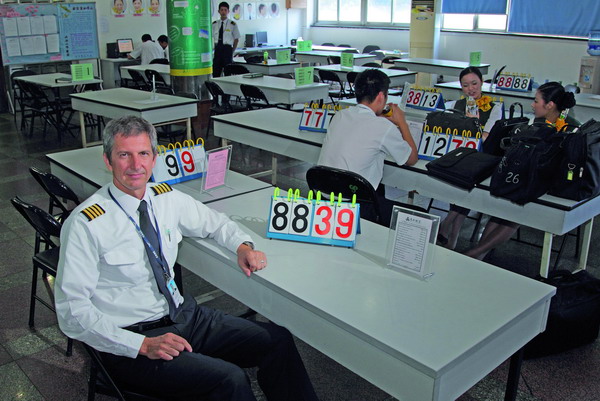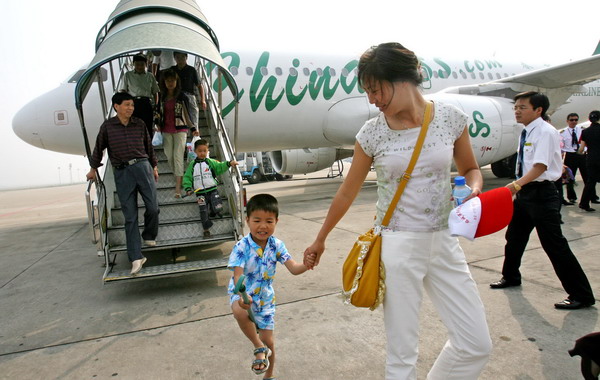|
 Roy Weinberg, once a pilot with US Airways, is now a captain for Spring Airlines in China. [Photo by Gao Erqiang / China Daily]
|
After spending much of his career with the same airline, Roy Weinberg was, not to put too fine a point on it, bored.
So, about a year ago, the 48-year-old quit his job with US Airways and moved to Shanghai to work as a captain for Spring Airlines.
"I had been doing the same job for 20 years and have another 15 years to go," said Weinberg, who moved to Shanghai before bringing his family of four along.
"I said to myself, 'It's too boring. Let's do something else for a few years and then come back'."
He is not alone. Many of his aviator friends are now flying for airlines in Chengdu and Beijing, he said.
The companies, he said, have a strong demand for foreign pilots, especially younger ones. Spring Airlines, for example, employs a team of 30 foreign pilots, and Hainan Airlines has 46.
By the beginning of 2011, China was home to at least 1,300 foreign flight captains, according to Li Jiaxiang, director of the Civil Aviation Administration of China.
With the expansion of Chinese airlines, a serious shortage of talent has arisen. By 2015, China's aviation industry is expected to need 18,000 more pilots, according to China Business News.
"One of the chief reasons why we are desperate for foreign pilots lies in the long amount of time it takes to prepare our own aviation workers," said Zhang Wu'an, spokesman for Spring Airlines. Training a flight captain in China takes about 10 years, he said.
"Water that's far away doesn't do you much good if you are thirsty now," he said. "The quickest way to supply our needs turned out to be to hire foreign pilots."
A senior manager of a mainland cargo airline, who did not want to give his name, said that when the company was faced with a shortage of flight captains, it quickly began to recruit foreigners.
|
 This 2007 photo shows the first aircraft to fly Spring Airlines' route from Wuhan to Shanghai. The plane landed at the Tianhe airport in Wuhan. [Photo by Zhou Guoqiang/for China Daily]
|
At a time when more and more air cargo is being transported in China, planes keep being added to the company's fleet and the demand for flight personnel continues to increase. In 2006, the company recruited eight foreign captains.
Between 2009 and 2010, when a group of Chinese flight captains retired, the company found itself without enough personnel to fly its planes. Its demand for foreign workers increased accordingly.
China's system for training pilots requires student to spend about 10 years preparing to become a captain permitted to fly a wide-body plane such as a Boeing 747 or 777, the manager said.
"Even if we had begun to train pilots when the company was founded, we still would not have as many captains as we need," he said.
So the airline went out looking for pilots from other countries. During the recent economic downturn, airlines in Japan, the US and other places cut jobs, giving Chinese airlines an opportunity to recruit large numbers of personnel.
Without much trouble, the company signed contracts with airline captains from more than 10 countries and regions, including Japan, South Korea, Europe and South America. Now more than 50 foreign captains work for the airline, making up 50 percent of the captains and 25 percent of the pilots there. The company plans to keep expanding its fleet in the next four years and eventually hire as many as 120 foreign captains, he said.
Because of the need for pilots, Chinese companies are willing to pay foreign airline captains "more than what they're worth", Weinberg said.
According to Zhang Wu'an, spokesman for Spring Airlines, Spring Airlines offers foreign pilots from $150,000 to $160,000 a year after taxes. The salaries of Chinese pilots, in contrast, usually come to between $93,250 and $108,800 a year.
The anonymous senior manager said Japanese and South Korean airline captains find their after-tax earnings in China are higher than they would be in their home countries.
"Foreigners are willing to come (to China) in part because they believe there will continue to be a strong demand here for air transport, which will give them a stable job," he continued.
What's more, the price of food and many other goods remains fairly low in China, which makes life easier for foreigners. And they often enjoy better terms of employment.
Unlike their Chinese counterparts, who usually sign a 15-year contract with an airline, foreign pilots can sign agreements obliging them to work from one year to three years with a company.
He said foreigners are valued because they can help Chinese pilots learn more about international flight routes and English.
"Even if we will have enough Chinese captains one day, foreign captains are still likely to amount for 20 percent of the total (we employ)," he said. "Such a workforce composition will help to improve the whole team."
In the US and most of the Western world, the oldest pilots and those with the most seniority at a particular airline are given the greatest amount of leeway to pick their own schedules, Weinberg said. That system used to be a cause of annoyance to many of his younger friends who now fly for Chinese airlines.
"Back in the US, their schedules weren't so good," he said. "That's why they took a leave to fly in China until they get better pay."
Chinese airlines prefer to hire young pilots in part because the country's retirement age in that profession is 60, five years in advance of what the age is in most other places in the world. The youngest foreign captains at Spring Airlines are in their 30s, said Xiao Fei, who works for the airlines' foreign pilot and student pilot management office.
Despite the increasing number of foreign pilots in China, the public had not paid much attention to them until a recent incident involving a South Korean caught its notice.
On Aug 13, the captain of a Juneyao Airlines flight ignored instructions coming from air traffic controllers at the Shanghai Hongqiao airport and refused to delay his own landing to give another aircraft time to make an emergency touchdown. The pilots of both planes said they were about to run out of fuel.
But an investigation by the Civil Aviation Administration of China found that the Juneyao Airbus 320-200 contained enough fuel to stay in the air for another 42 minutes, while the Qatar Airways Boeing 777-300ER could only remain in flight for 18 minutes.
Found to be in the wrong, the captain of the Juneyao flight was banned from continuing to work as a pilot in China. Among other punishments, the company is now prohibited from pursuing its expansion plans or hiring foreign workers.
Weinberg said the incident should be taken as a sign that China should improve the system it uses to ensure the safety of passengers and flight crews, rather than simply as something the captain should be punished for.
"This incident is a perfect example to show that more than one person needs to take responsibility," he said.
"There were lots of things that happened that created the situation. It wasn't one person making one decision at one time. It was a large event. In China, a captain is always the one who gets in trouble, while in America, everybody takes responsibility."
Why, Weinberg asked, isn't anyone looking at the part played in the incident by the air control officer who spoke to the pilot? He knew the person he was speaking to was a foreigner yet still spoke only in Chinese.
"It happened to me before," he continued. "They always speak Chinese to me. My first officer has to interpret for me since I don't know Chinese."
Zhang Qihuai, an aviation law expert with the Beijing-based Lan Peng Law Firm, later verified Weinberg's statement by saying "language turned out to be one of the chief causes of the incident".
Even though English has been designated as the official language to be used in communications about international flights, as well flights to Beijing, Shanghai and Guangzhou in China, Xiao said air controllers still speak Chinese to foreign pilots during peak flight hours.
"What happened to me many times is that everybody around me is getting commands in Chinese, and I'm the only English-speaking (pilot) in the air," Weinberg said. "They speak to me in English, but speak to everybody else in Chinese. I don't know what's happening since I don't know what other airplanes around me are doing."
If even one pilot is speaking English on airline radios, air traffic controllers should speak English to everyone else who is flying nearby, he said.
To prevent an incident like the one involving the South Korean from occurring, he said China should review the system it uses to ensure the safety of flights.
"Punishing one pilot doesn't solve any problem," he said.
Huang Yimin contributed to this report.
